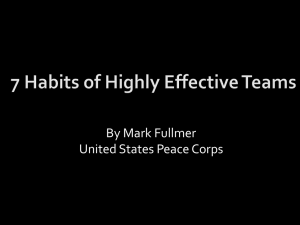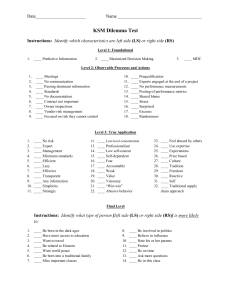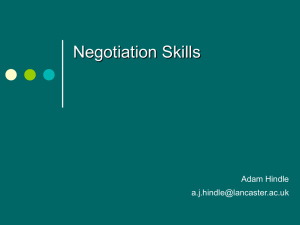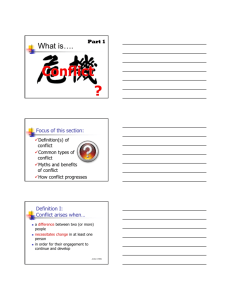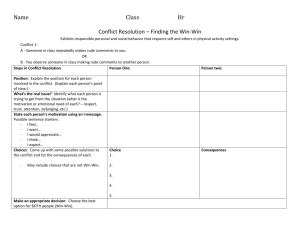Win-win negotiations – Questions and answers1
advertisement
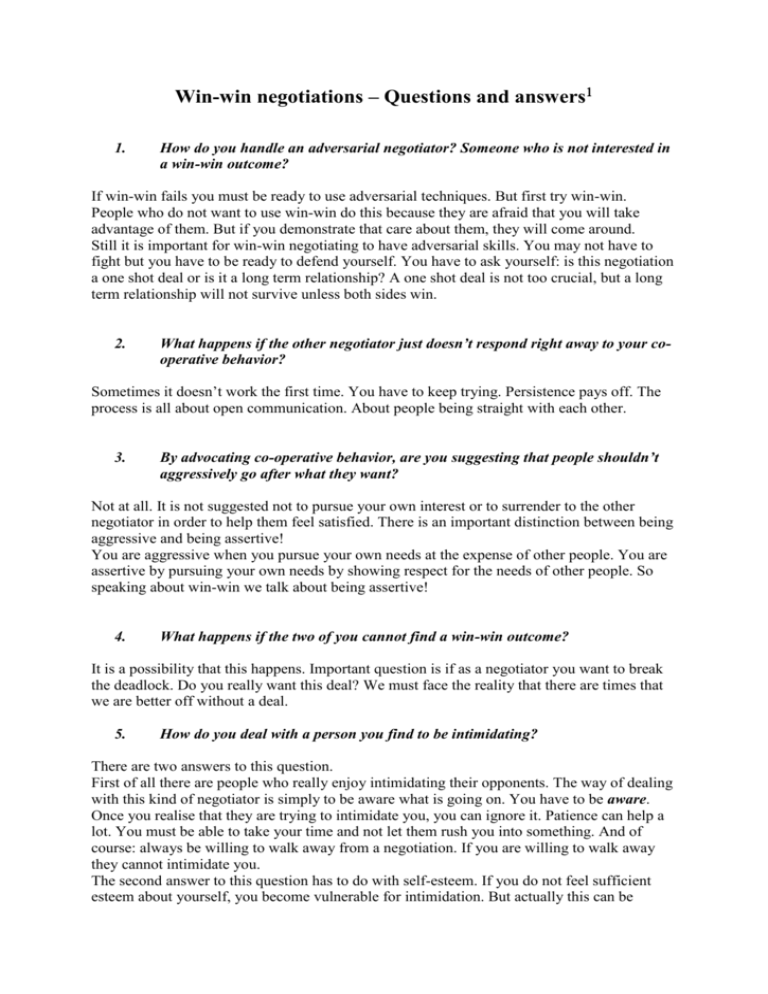
Win-win negotiations – Questions and answers 1. How do you handle an adversarial negotiator? Someone who is not interested in a win-win outcome? If win-win fails you must be ready to use adversarial techniques. But first try win-win. People who do not want to use win-win do this because they are afraid that you will take advantage of them. But if you demonstrate that care about them, they will come around. Still it is important for win-win negotiating to have adversarial skills. You may not have to fight but you have to be ready to defend yourself. You have to ask yourself: is this negotiation a one shot deal or is it a long term relationship? A one shot deal is not too crucial, but a long term relationship will not survive unless both sides win. 2. What happens if the other negotiator just doesn’t respond right away to your cooperative behavior? Sometimes it doesn’t work the first time. You have to keep trying. Persistence pays off. The process is all about open communication. About people being straight with each other. 3. By advocating co-operative behavior, are you suggesting that people shouldn’t aggressively go after what they want? Not at all. It is not suggested not to pursue your own interest or to surrender to the other negotiator in order to help them feel satisfied. There is an important distinction between being aggressive and being assertive! You are aggressive when you pursue your own needs at the expense of other people. You are assertive by pursuing your own needs by showing respect for the needs of other people. So speaking about win-win we talk about being assertive! 4. What happens if the two of you cannot find a win-win outcome? It is a possibility that this happens. Important question is if as a negotiator you want to break the deadlock. Do you really want this deal? We must face the reality that there are times that we are better off without a deal. 5. How do you deal with a person you find to be intimidating? There are two answers to this question. First of all there are people who really enjoy intimidating their opponents. The way of dealing with this kind of negotiator is simply to be aware what is going on. You have to be aware. Once you realise that they are trying to intimidate you, you can ignore it. Patience can help a lot. You must be able to take your time and not let them rush you into something. And of course: always be willing to walk away from a negotiation. If you are willing to walk away they cannot intimidate you. The second answer to this question has to do with self-esteem. If you do not feel sufficient esteem about yourself, you become vulnerable for intimidation. But actually this can be turned around to your advantage. Suppose you are dealing with someone who is older or more knowledgeable than you are, you can say to them: “I really do not understand this, can you help me out of this. I really need your help.” Utimately nobody can intimidate you without your participation. So the advice is: don’t give away your power. 6. What are the biggest mistakes people make when they negotiate? To talk too much and to be in too much of a hurry. In World War II they had the slogan: ‘Loose lips sink ships”. In other words, if you know something that is vital for the war effort, keep your mouth shut. The guy next to you might be a spy. This slogan should be borne in mind by all negotiators. Many people sabotage themselves by talking too much and listening too little. That’s why the second win-win rule is developing trust by listening. In fact negotiators generally do not achieve much by talking a lot and paying little attention to what the other negotiator was saying. It’s ironic that most people think that they have to say what they have to say. If these people really think it is important that they have to say it, theyshould realize that some of what they say can really hurt them in adversarial negotiations if it gives away their real intentions. ‘If you give me a chance I will tell you everything you need to know’. The only thing that is important is what you hear. The second fatal mistake people tend to make: they don’t take their time. Win-win negotiations just do not come about in a flash of light. It needs time to develop the necessary relationship and then to explore more options. Often people want things to be over as quickly as possible. Just try to think back to your personal negotiation experience. How many consessions have you made because you were in a hurry? Whoever is more flexible about time has the advantage. 7. What’s the most important single piece of advice you can give about negotiating? Always be willing to walk away. If you want something too badly you loose your power, which comes from your ability to say ‘No’. An other way of putting this is: never negotiate without options. When you have alternatives, when you are not desperate, that’s when other people will give you what you want. For instance we have all experienced looking for a job. It’s always easier to interview for a job, if you already have a job. You don’t need a new job and they want to hire you because somebody else hired you. Even in a win-win negotiation you are in a much stronger position when you are not desperate. Your judgement is not clouded by fear, you can take your time. You can reassure the other negotiator that you are not here because you have to be here. You are here because you want to be here. It is amazing how fears are communicated. If you want to make a deal, it is not necessary for you to inform the other negotiator that you are in trouble. And conversely, if you are willing to walk out if the result is not to your liking, then that too is communicated. The other negotiator can sense your strength and they will bend in order to reach an agreement with you. Source: The three rules of win-win negotiations, Ed Brodow Seminars, U.S.A.
